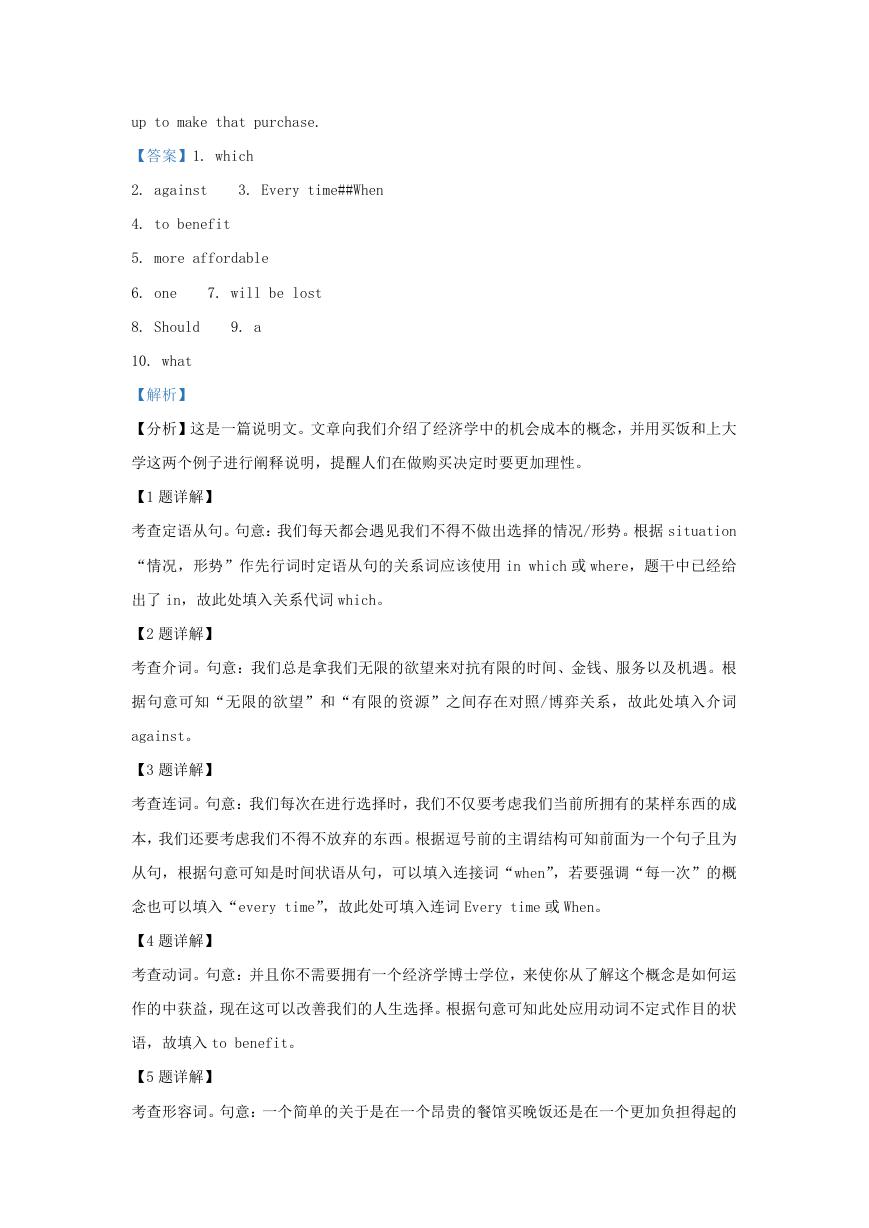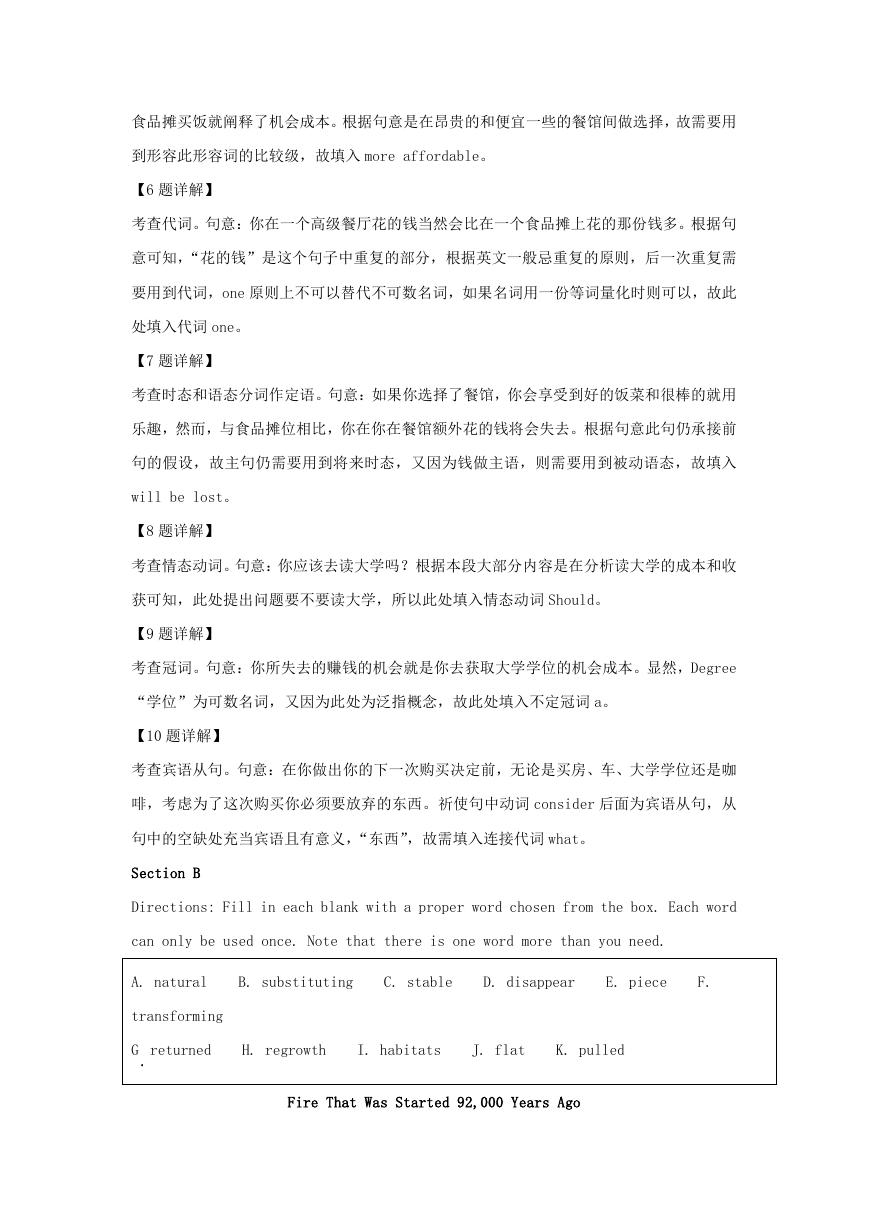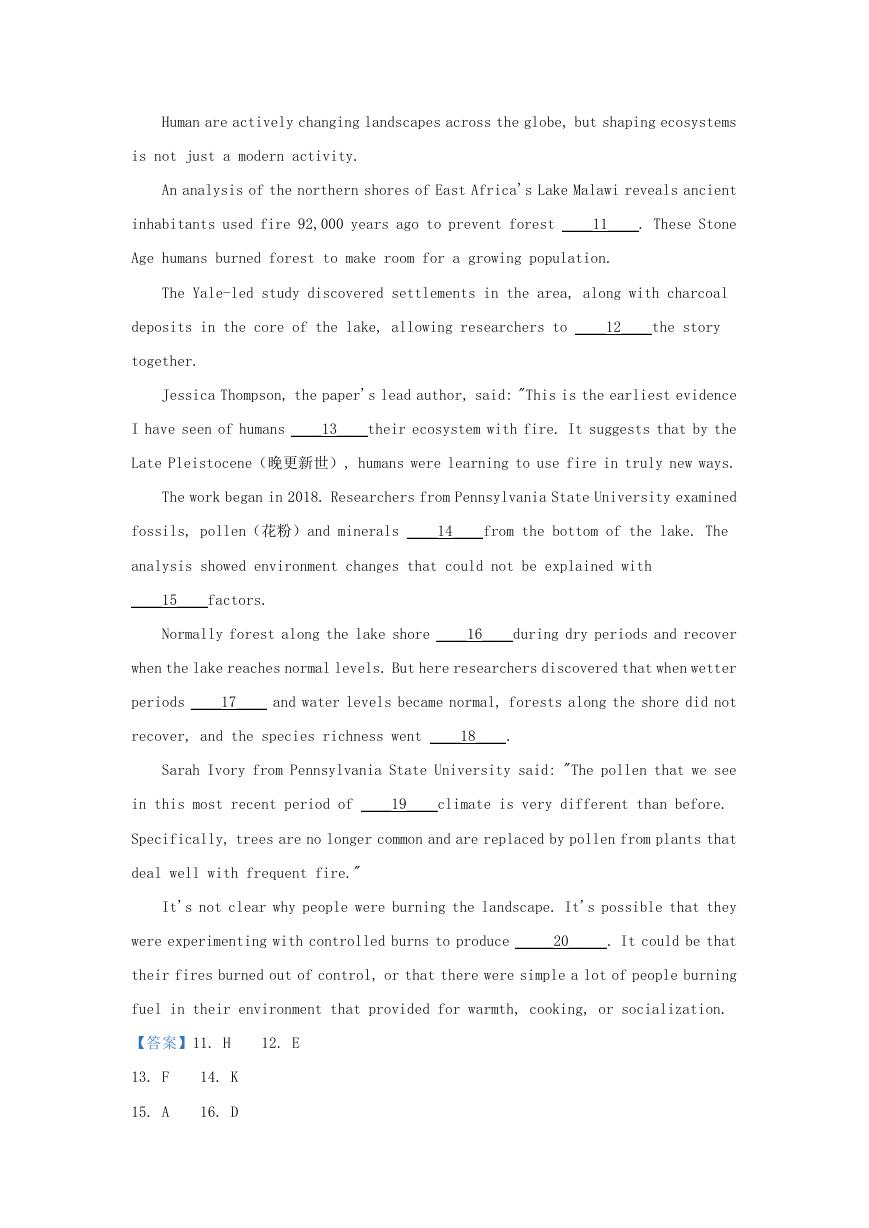2021-2022 学年上海市杨浦区高三上学期期中英语试题及答
II. Grammar and Vocabulary Section A
案
Directions: After reading the passage below, fill in the blanks to make the passages
coherent and grammatically correct. For the blanks with a given word, fill in each
blank with the proper form of the given word; for the other blanks, use one word
that best fits each blank.
How Much Understanding Opportunity Cost
Decisions, decisions! Every day we come across situations in ____1____we have
to make a choice. Economists have long realized that when we make decision, we are
considering our unlimited wants ____2____limited time, money, services, and
opportunities.
____3____we choose, we not only have to think about the cost of one item we can
have now, but we must take into account the thing we have to give up. Economists
call this "opportunity cost," and you don't have to have a PhD in economics
____4____(benefit) from knowing how the concept works and now it can improve our
life choices.
A simple choice between buying a dinner in an expensive restaurant and at a
____5____(affordable) food stand can illustrate opportunity cost. The money you
spend on the high-class restaurant meal is certain to be more than the ____6____at
a food stand. If you choose the restaurant, you will enjoy a good meal and the
enjoyment of fine dining. However, the extra money spent on the meal compared to
the food from the food stand ____7____(lose). You sacrifice cheaper meal for a
costlier one. This is an example of "opportunity cost."
____8____you go to college? That would take at least four years plus the expenses
for tuition, books, and other supplies. During that time you would probably not be
earning any money. The lost opportunity of earning money is your opportunity cost
of obtaining ____9____college degree. Before you make your next purchase, whether
for a house, car, college degree, or just coffee, consider _____10_____you must give
�
up to make that purchase.
【答案】1. which
2. against
3. Every time##When
4. to benefit
5. more affordable
6. one
7. will be lost
8. Should
9. a
10. what
【解析】
【分析】这是一篇说明文。文章向我们介绍了经济学中的机会成本的概念,并用买饭和上大
学这两个例子进行阐释说明,提醒人们在做购买决定时要更加理性。
【1 题详解】
考查定语从句。句意:我们每天都会遇见我们不得不做出选择的情况/形势。根据 situation
“情况,形势”作先行词时定语从句的关系词应该使用 in which 或 where,题干中已经给
出了 in,故此处填入关系代词 which。
【2 题详解】
考查介词。句意:我们总是拿我们无限的欲望来对抗有限的时间、金钱、服务以及机遇。根
据句意可知“无限的欲望”和“有限的资源”之间存在对照/博弈关系,故此处填入介词
against。
【3 题详解】
考查连词。句意:我们每次在进行选择时,我们不仅要考虑我们当前所拥有的某样东西的成
本,我们还要考虑我们不得不放弃的东西。根据逗号前的主谓结构可知前面为一个句子且为
从句,根据句意可知是时间状语从句,可以填入连接词“when”,若要强调“每一次”的概
念也可以填入“every time”,故此处可填入连词 Every time 或 When。
【4 题详解】
考查动词。句意:并且你不需要拥有一个经济学博士学位,来使你从了解这个概念是如何运
作的中获益,现在这可以改善我们的人生选择。根据句意可知此处应用动词不定式作目的状
语,故填入 to benefit。
【5 题详解】
考查形容词。句意:一个简单的关于是在一个昂贵的餐馆买晚饭还是在一个更加负担得起的
�
食品摊买饭就阐释了机会成本。根据句意是在昂贵的和便宜一些的餐馆间做选择,故需要用
到形容此形容词的比较级,故填入 more affordable。
【6 题详解】
考查代词。句意:你在一个高级餐厅花的钱当然会比在一个食品摊上花的那份钱多。根据句
意可知,“花的钱”是这个句子中重复的部分,根据英文一般忌重复的原则,后一次重复需
要用到代词,one 原则上不可以替代不可数名词,如果名词用一份等词量化时则可以,故此
处填入代词 one。
【7 题详解】
考查时态和语态分词作定语。句意:如果你选择了餐馆,你会享受到好的饭菜和很棒的就用
乐趣,然而,与食品摊位相比,你在你在餐馆额外花的钱将会失去。根据句意此句仍承接前
句的假设,故主句仍需要用到将来时态,又因为钱做主语,则需要用到被动语态,故填入
will be lost。
【8 题详解】
考查情态动词。句意:你应该去读大学吗?根据本段大部分内容是在分析读大学的成本和收
获可知,此处提出问题要不要读大学,所以此处填入情态动词 Should。
【9 题详解】
考查冠词。句意:你所失去的赚钱的机会就是你去获取大学学位的机会成本。显然,Degree
“学位”为可数名词,又因为此处为泛指概念,故此处填入不定冠词 a。
【10 题详解】
考查宾语从句。句意:在你做出你的下一次购买决定前,无论是买房、车、大学学位还是咖
啡,考虑为了这次购买你必须要放弃的东西。祈使句中动词 consider 后面为宾语从句,从
句中的空缺处充当宾语且有意义,“东西”,故需填入连接代词 what。
Section B
Directions: Fill in each blank with a proper word chosen from the box. Each word
can only be used once. Note that there is one word more than you need.
A. natural
B. substituting
C. stable
D. disappear
E. piece
F.
transforming
G. returned
H. regrowth
I. habitats
J. flat
K. pulled
Fire That Was Started 92,000 Years Ago
�
Human are actively changing landscapes across the globe, but shaping ecosystems
is not just a modern activity.
An analysis of the northern shores of East Africa's Lake Malawi reveals ancient
inhabitants used fire 92,000 years ago to prevent forest ____11____. These Stone
Age humans burned forest to make room for a growing population.
The Yale-led study discovered settlements in the area, along with charcoal
deposits in the core of the lake, allowing researchers to ____12____the story
together.
Jessica Thompson, the paper's lead author, said: "This is the earliest evidence
I have seen of humans ____13____their ecosystem with fire. It suggests that by the
Late Pleistocene(晚更新世), humans were learning to use fire in truly new ways.
The work began in 2018. Researchers from Pennsylvania State University examined
fossils, pollen(花粉)and minerals ____14____from the bottom of the lake. The
analysis showed environment changes that could not be explained with
____15____factors.
Normally forest along the lake shore ____16____during dry periods and recover
when the lake reaches normal levels. But here researchers discovered that when wetter
periods ____17____ and water levels became normal, forests along the shore did not
recover, and the species richness went ____18____.
Sarah Ivory from Pennsylvania State University said: "The pollen that we see
in this most recent period of ____19____climate is very different than before.
Specifically, trees are no longer common and are replaced by pollen from plants that
deal well with frequent fire."
It's not clear why people were burning the landscape. It's possible that they
were experimenting with controlled burns to produce _____20_____. It could be that
their fires burned out of control, or that there were simple a lot of people burning
fuel in their environment that provided for warmth, cooking, or socialization.
【答案】11. H
12. E
13. F
14. K
15. A
16. D
�
17. G
18. J
19. C
20. I
【解析】
【分析】本文是说明文。文章介绍了考古发现早期人类是生态系统工程师。他们用火的方式
阻止了该地区森林的再生,形成了今天存在的一片广阔的低矮灌木林。
【11 题详解】
考查名词。句意:一项对东非马拉维湖北部海岸的分析显示,古代居民在 92000 年前使用火
灾来防止森林的再生。分析句子可知,需填名词作宾语,根据下文的“These Stone Age humans
burned forest to make room for a growing population.(这些石器时代的人类烧毁森林,
为不断增长的人口腾出空间)”可推断,古代居民用大火阻止森林再生,regrowth“再生”
不可数名词,符合题意,故选 H。
【12 题详解】
考查动词。句意:耶鲁大学领导的研究发现了该地区的定居点,和湖中心的木炭沉积物,让
研究人员可以把这个故事拼凑起来。to 是不定式符号,故填动词,由句意可知,一个分析
让研究人员拼凑出这个故事,piece“拼凑”符合句意,故选 E。
【13 题详解】
考查动词。句意:该论文的主要作者埃西卡·汤普森说:“这是我所看到的最早的关于人类
用火改变生态系统的证据”。根据句意可知,此处说明人们用火改变生态系统,transform
“改变;转变”符合语境,分析句子可知,介词 of 后接动名词作宾语,human 是动名词的
逻辑主语,故选 F。
【14 题详解】
考查动词。句意:这项工作始于 2018 年。来自宾夕法尼亚州立大学的研究人员检查了从湖
底拖出来的化石、花粉和矿物质。根据句意可知,这些化石,花粉和矿物质来自湖底,pull
“拖;拉”符合题意,作后置定语,pull 与 fossils, pollen(花粉)and minerals 之间
是被动关系,故用过去分词形式作定语,故选 K。
【15 题详解】
考查形容词。句意:分析显示,环境变化无法用自然因素来解释。此处用形容词作定语,修
饰名词,根据下一段内容可知,此处说的是自然因素无法介绍环境变化。natural“自然的”
形容词作定语,故选 A。
【16 题详解】
�
考查动词。句意:通常沿湖岸的森林在干燥时期消失,当湖泊达到正常水平时恢复。分析句
子可知,缺少谓语动词用动词形式,根据下文“recover when the lake reaches normal
levels”可推断,干燥时期森林消失,描述客观事实用一般现在时,主语 forest 是单数,
disappear“消失”动词作谓语。故选 D。
【17 题详解】
考查动词。句意:但研究人员发现,当较湿润时期回归和水位恢复正常时,沿岸森林没有恢
复,物种丰富度趋于平稳。分析句子可知,空格处填动词作谓语,根据上文“recover when
the lake reaches normal levels”可知,较湿润时期回归,森林恢复正常,return“返回;
回归”符合语境,且描述过去的事情,用一般过去时。故选 G。
【18 题详解】
考查形容词。句意:但研究人员发现,当较湿润时期回归和水位恢复正常时,沿岸森林没有
恢复,物种丰富度趋于平稳。go 是系动词,接形容词作表语,根据上文“forests along the
shore did not recover”可知,森林没有恢复,物种丰富度趋于平稳。flat“停滞的;平
淡的”符合语境,故选 J。
【19 题详解】
考查形容词。句意:我们在最近一段稳定气候时期看到的花粉与以前大不相同。分析句子可
知,用形容词作定语,根据下文“replaced by pollen from plants that deal well with
frequent fire.”可知,此处表示稳定时期看到的花粉不同于以前火灾时期看到的。stable
“稳定的”符合语境,故选 C。
【20 题详解】
考查名词。句意:有可能是他们在试验控制烧伤来产生有利于狩猎和采集的栖息地。分析句
子可知,填名词作宾语,由上文“they were experimenting with controlled burns”以
及句意可推断,此处说明古代居民通过有控制的燃烧创造栖息地,habitat“栖息地”符合
语境,是可数名词,用复数,故选 I。
III. Reading Comprehensions
Section A
Directions: For each blank in the following passage, there are four words or phrases
marked A, B,C and D. Fill in each blank with the word or phrase that best fits the
context.
Dealing with Digital Shame
�
Some argue shame can be a forceful tool for change. But when it's weaponized
against others in ____21____digital spaces, these same strategies can turn into
hurtful behaviours, like cyberbullying and online harassment (骚扰).
Getting called out, insulted or bullied isn't exactly ____22____. But the
Internet's ability to strengthen and permanently ____23____those messages is. And
this tool is now in the hands of most young people. Here's how experts recommend
guiding kids and teens through this digital landscape.
1. Think before you post.
In the digital age, what we share can become ____24____. It's also a way of
____25____ourselves to others, says web safety expert Nancy Willard. ____26____,
consider what your social media footprint says about you. "Write down the key words
that you would like other people to use when they describe you," Willard says. "Then,
when you're ____27____ something, [ask yourself], 'Does that reflect those
qualities?'"
2. Work through scenarios (可能场景) in advance.
If someone attacks you online, says Justin W. Patching, co-director of the
Cyberbullying Research Centre, you might feel the desire -- even the need to respond.
Instead, parents should consider helping their kids ____28____such situations
beforehand. "Given them a situation," he says, "to just practice those skills of
____29____or making a joke of it."
3. Stop and stay calm.
It's easy for a delicate digital argument to make your blood boil. "If you're
upset, realize that the threat _____30_____centre of your brain has taken over,"
Willard says. "Unfortunately, when this happens, your emotional _____31_____and
your thinking centres go offline." But there are ways to remain cool. Take some deep
breaths. Step away from the keyboard. Go for a walk outside.
4. Put yourself in the other person' s shoes.
If you're being belittled online, it may say more about the other person than
it does about you, says psychologist Sherry Turkle. "If you can keep that in mind,"
she says, "then the whole experience will seem less _____32_____to you,
�
emotionally."
5. Empower yourself with tools.
If you find yourself being cyberbullied, often the tech itself can provide a
number of simple ways to respond: Blocking the _____33_____. Reporting hurtful
exchanges. Taking screenshots. Saving message threads. Having that _____34_____can
help if the behaviours do escalate beyond one hurtful offense to repeated,
long-standing harassment. It's a lot easier for authorities to get involved when
they can see _____35_____what's going on.
21. A. stored
B. shared
C. shifted
D.
secured
22. A. local
B. true
C. easy
D. new
23. A. document
B. define
C. distract
dominate
24. A. internal
virtual
B. relevant
C. permanent
25. A. presenting
B. adjusting
C. restricting
devoting
D.
D.
D.
26. A. In contrast
B. In short
C. In fact
D. In the
end
27. A. printing
B. piling
C. posting
passing
28. A. substitute for
B. appeal to
C. recover from
prepare for
29. A. ignoring
B. isolating
C. imitating
identifying
30. A. response
B. review
C. relief
reserve
31. A. integration
B. regulation
C. modification
interruption
D.
D.
D.
D.
D.
�
















 2023年江西萍乡中考道德与法治真题及答案.doc
2023年江西萍乡中考道德与法治真题及答案.doc 2012年重庆南川中考生物真题及答案.doc
2012年重庆南川中考生物真题及答案.doc 2013年江西师范大学地理学综合及文艺理论基础考研真题.doc
2013年江西师范大学地理学综合及文艺理论基础考研真题.doc 2020年四川甘孜小升初语文真题及答案I卷.doc
2020年四川甘孜小升初语文真题及答案I卷.doc 2020年注册岩土工程师专业基础考试真题及答案.doc
2020年注册岩土工程师专业基础考试真题及答案.doc 2023-2024学年福建省厦门市九年级上学期数学月考试题及答案.doc
2023-2024学年福建省厦门市九年级上学期数学月考试题及答案.doc 2021-2022学年辽宁省沈阳市大东区九年级上学期语文期末试题及答案.doc
2021-2022学年辽宁省沈阳市大东区九年级上学期语文期末试题及答案.doc 2022-2023学年北京东城区初三第一学期物理期末试卷及答案.doc
2022-2023学年北京东城区初三第一学期物理期末试卷及答案.doc 2018上半年江西教师资格初中地理学科知识与教学能力真题及答案.doc
2018上半年江西教师资格初中地理学科知识与教学能力真题及答案.doc 2012年河北国家公务员申论考试真题及答案-省级.doc
2012年河北国家公务员申论考试真题及答案-省级.doc 2020-2021学年江苏省扬州市江都区邵樊片九年级上学期数学第一次质量检测试题及答案.doc
2020-2021学年江苏省扬州市江都区邵樊片九年级上学期数学第一次质量检测试题及答案.doc 2022下半年黑龙江教师资格证中学综合素质真题及答案.doc
2022下半年黑龙江教师资格证中学综合素质真题及答案.doc